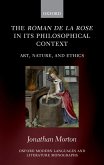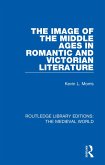Remembering Boethius explores the rich intersection between the reception of Boethius's Consolation of Philosophy and the literary construction of aristocratic identity. Elliott presents new interpretations of Machaut's Confort d'ami, Remede de Fortune and Fonteinne amoureuse, Froissart's Prison amoureuse, Thomas Usk's Testament of Love and the Kingis Quair. In asking how and why medieval writers remember Boethius, this book sheds new light on how medieval people imagined, and reimagined themselves.
Dieser Download kann aus rechtlichen Gründen nur mit Rechnungsadresse in A, B, BG, CY, CZ, D, DK, EW, E, FIN, F, GR, HR, H, IRL, I, LT, L, LR, M, NL, PL, P, R, S, SLO, SK ausgeliefert werden.









